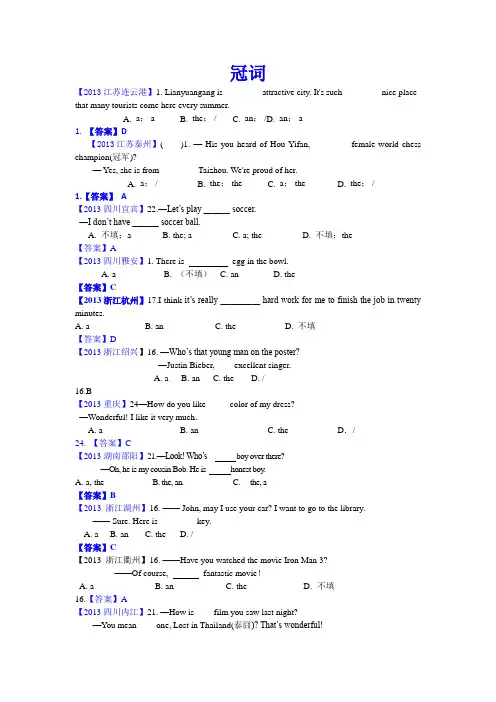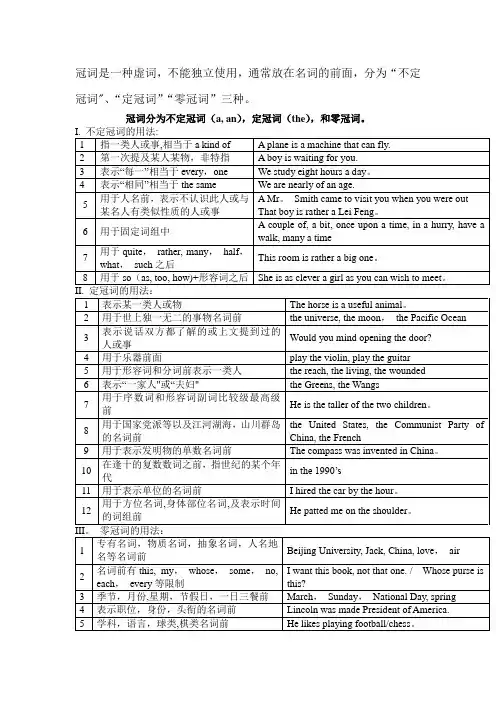13年中考英语复习冠词1
- 格式:ppt
- 大小:760.00 KB
- 文档页数:13

名词知识中考总复习二名词、代词和冠词一、中考要求:中考关于名词的考查要求是:可数名词和不可数名词的用法;可数名词的单、复数形式;名词所有格的用法。
重点考查名词的复数形式和名词所有格。
同学们一定要掌握名词的单、复数形式的变化规则和名词所有格的用法。
二、知识要点:1. 可数名词和不可数名词:英语的名词可以分为可数名词和不可数名词。
表示可以计数的事物的名词叫可数名词,一般有单数和复数形式两种形式,但有时两种形式是相同的。
可数名词单数形式可以与不定冠词连用,例如:a book(一本书);an apple (一个苹果)。
可数名词复数形式可以与few,a few,many,several等连用,例如:a few girls。
不可数名词是表示不可以计数的事物的名词,不能用不定冠词a(an)或数词one修饰,并且不分单复数,物质名词、抽象名词和专有名词一般都是不可数的,例如:milk (牛奶);education(教育)。
2. 可数名词的单数变为复数的规则:(1)一般情况下,在可数名词的单数形式后面加字母-s构成复数形式。
例如:book - books pen - pens eraser - erasers(2)以字母x;s;ch;sh结尾的单词,其复数形式是在单词后面加字母-es。
例如:bus - buses box - boxes watch - watches(3)以辅音字母+y结尾的可数名词,其复数形式是把字母y变为i再加-es。
例如:baby - babies country-countries city - cities注意:如果是以元音字母+y结尾的单词则直接加字母-s。
例如:boy - boys toy-toys(4)以字母f或者fe结尾的可数名词,其复数形式是先把字母f变为v再加-es。
例如:wife-wives leaf-leaves knife-knives(5)以字母o结尾的可数名词,其复数形式一般加-s,也有几个单词是加字母-es。

中考英(Ying)语专题复习:冠词中考英语专项(Xiang)复习(Xi)——冠(Guan)词【冠(Guan)词命(Ming)题】考查重(Zhong)点为:1.不定冠(Guan)词、定冠词、零冠词的使用情况;2.不定冠词a和an的使用情况。
❖解题关键:熟记各种冠词的适用范围!【考点诠释】一、不定冠词a和an1.不定冠词一般只用于“单数可数名词”之前1)“a”用于以辅音音素开头的单词前;2)“an”用于以元音音素开头的单词前。
[a]、[e]、[i]、[o]、[u]There is “A.aB. anC.theD. /【点拨】第一步分析语境:单词“summer”中有“s”。
可知,这里要表达单词“summer”中有一个“s”,故排除表特指的定冠词the和零冠词;第二步:空格后的“s”是以元音音素开头的字母,故选不定冠词an,选B。
3)不定冠词的基本用法(1)用于第一次提到的人或事物的名称前。
eg: I saw a boy over there. He was sleeping. 我在那边看到一个男孩。
他正在睡觉。
(2)用来指一类人或事物中的任何一个,相当于any。
eg: I want to buy an English book. 我想买本英语书。
(3)表示数量,相当于one或each。
eg: I have a mouth and a nose. 我有一个嘴巴和一个鼻子。
(4)指某人或某物,但不具体指明哪个人或物。
eg: A man is waiting for you at the gate. 有个(Ge)人在门口等你。
(5)表(Biao)示类别,泛指一类人或物。
eg: A horse is much bigger than a rabbit. 马比兔子大得(De)多。
(6)表(Biao)示(Shi)“每(Mei)一(Yi)”的(De)意思,相当于every。
eg: once a week 一周一次200 kilometers an hour 每小时200公里(7)用在such,quite,rather,half,what等词之后。


2013年中考英语易错题汇编一、名词、冠词1.--What can I do for you?--I’d like two _______.A. box of appleB. boxes of applesC. box of applesD. boxes of apple2.Help yourself to _________.A. some chickensB. a chickenC. some chickenD. any chicken3.________ it is today!A. What fine weatherB. What a fine weatherC. How a fine weatherD. How fine a weather4.Which is the way to the __________?A. shoe factoryB. shoes factoryC. shoe’s factoryD. shoes’factory5.This class ________ now. Miss Gao teaches them.A. are studyingB. is studyingC. be studyingD. studying6.We will have a _________ holiday after the exam.A. two monthB. two-monthC. two month’sD. two-months7.________ trees are cut down in the forests every year.A. ThousandB. ThousandsC. Thousand ofD. Thousands of8.Our sports meeting will be held ________.A. on 24, Tuesday, AprilB. in April 24, TuesdayC. on Tuesday, April 24D. in April Tuesday 249_________ people here are very friendly to us.A. TheB. /C. AD. An10..There is no enough ________ in the corner to put the table.A. placeB. roomC. floorD. ground二、代词11.Some people like to stay at home, but ________ like to go to the cinema.A. anotherB. otherC. othersD. other one12.-- Is this your shoe?-- Yes, but where is _________?A. the other oneB. other oneC. another oneD. the others13.– When shall we meet again next week?-- _______ day is possible. It’s no problem with me.A. EitherB. NeitherC. EveryD. Any14.Have you ever seen ________ big panda before?A. a suchB. such aC. so aD. a so15.-- _______ do you write to your parents?-- Once a month.A. How longB. How soonC. How oftenD. How far16.Robert has gone to _________ city and he’ll be back in a week.A. otherB. the otherC. anotherD. any other17.– A latest magazine, please.-- Only one left. Would you like to have ________?A. itB. oneC. thisD. that18.– Which book would you like to borrow?-- ________ of the two books is OK with me.A. EitherB. BothC. AnyD. None19.He knows _________ English ________ French. But he’s very good at Japanese.A. either; orB. both; andC. neither; norD. either; nor20.– What do your parents do?-- One is a teacher; _________ is a driver.A. otherB. anotherC. the otherD. that one21.Mrs. Lee teaches ________ math. We all like her.A. weB. usC. ourD. ours22.There are many trees on ________ side of the street.A. eitherB. anyC. allD. both23.________ is the population of the city?A. How manyB. WhatC. How many peopleD. How much三、介词、连词24.Japan is ________ the east of China.A. inB. toC. onD. at25.The postman shouted, “ Mr Green, here is a letter ________ you.”A. toB. fromC. forD. of26.We can’t do it ________ your help.A. withB. ofC. underD. without27.He hasn’t heard from his friend __________ last month.A. sinceB. by the end ofC. forD. until28.I didn’t buy the dictionary yesterday _________ my aunt would give me one.A. untilB. becauseC. ifD. before29.I’m going to look for another job ________ the company offers me more money.A. afterB. unlessC. whenD. for30.Don’t hurry. The bus won’t start ________ everybody gets on.A. sinceB. asC. untilD. when31.Please show me _________ to send an e-mail, John. It’s the first time for me to do it.A. howB. whatC. whenD. where32.You’ve passed the exam. I’m happy ______ you.A. onB. atC. inD. for33.I wonder ________ they finished so many different jobs in such a short time.A. whyB. howC. whenD. where34.-- Do you speak English?-- Yes, I speak _________ a little English _______ some French.A. neither, notB. both, orC. either, orD. not only, but also35.______ the maths problem is difficult, I’ll try very hard to work it out.A. ThoughB. WhenC. BeforeD. After36.The accident took place ________ a cold February evening.A. onB. inC. atD. for37.He turned ________ the radio because his father was asleep.A. onB. downC. upD. over38.I don’t know the homework _______ today.A. onB. inC. ofD. for39.–Oh, it’s raining heavily.-- Please don’t leave ________ it stops.A. whenB. afterC. sinceD. until40.Jane said she would come here ________ 9:00 and 9:30 tomorrow morning.A. fromB. atC. betweenD. around四、动词41.My father went to Shanghai yesterday. He ______ back in two weeks.A. comesB. has comeC. will comeD. came42..It’s spring now. The students ________ trees these weeks.A. plantB. are plantingC. will plantD. planted43..-- __________ you ________ your book to the library?-- Yes. I returned it yesterday.A. Did, returnB. Have, returnedC. Will, returnD. Do, return44.– Must I finish it now?-- No, you ________.A. mustn’tB. needn’tC. can’tD. shouldn’t45..Though it’s cloudy now, it _________ get sunny later.A. canB. mayC. mustD. need46.It is in the library, you _______ talk loudly.A. may notB. can’tC. needn’tD. mustn’t47..If anyone wants to say something in class, you ________ put up your hands first.A. mustB. mayC. shouldD. can48.–I called you last night but no one answered the phone.-- I ________ dinner with my friends in the restaurant.A. haveB. hadC. was havingD. have had49..If you have lost a library book, you have to _________ it.A. find outB. look afterC. pay forD. take care50..He will call me as soon as he _________ the city.A. reachesB. reachedC. will reachD. is reaching51.The pen _________ him ten yuan.A. paidB. costC. tookD. spent52..The train _________ for twenty minutes.A. leftB. has leftC. is leavingD. has been away53..–How many books _____ they ________?-- Five. But they haven’t finished reading even one.A. did…borrowB. had…borrowedC. will…borrowD. do…borrow54.He _________ his bike so he has to walk there.A. lostB. has lostC. had lostD. loses55.– Why did the policeman stop us?-- He told us not _______ so fast in this street.A. driveB. drivingC. to driveD. drove五、形容词、副词56.The population of the world in 20th century became very much _________ than that in 19th.A. biggerB. largerC. greaterD. more57.Miss Li is one of _______ in our school.A. a popular teacherB. more popular teacherC. most popular teacherD. the most popular teachers58.The magazines are ________ easy that the children can read them well.A. suchB. soC. tooD. very59.– Would you like ________ more tea?-- Thank you. I’ve had ________.A. any, muchB. some, enoughC. some, muchD. any, enough60.I think basketball is _______. I like to watch it.A. boringB. boredC. excitingD. excited61.This dinner looks _______ to me, and I like it.A. terribleB. goodC. badlyD. nicely62.The math problem is so hard that ________ students can work it out.A. a fewB. a littleC. manyD. few63.–What’s the weather like tomorrow?-- The radio says it is going to be even ______.A. badB. worstC. badlyD. worse64.Though she talks ______, she has made ________ friends here.A. a little, a fewB. little, fewC. little, a fewD. few, a few65.He never does his work _______ Mary.A. as careful asB. so careful asC. as carefully asD. carefully as六、句法66..If it ________ tomorrow ,we’ll go to the park.A. will not rainB. doesn’t rainC. is not rainingD. didn’t rain67.The radio says the snow ______ late in the day.A. stopsB. will stopC. has stoppedD. stopped68.The nurse told the children the sun ______ in the east.A. risesB. roseC. will riseD. has risen69.–Are you sure you have to? It’s been very late.-- I don’t know ______ I can do it if notnow.A. whereB. whyC. whenD. how70.- Could you tell me _______ she is looking for?-- Her cousin, Susan.A. thatB. whoseC. whomD. which71.–When are the Shutes leaving for New York?-- Pardon?-- I asked ___________.A.when are the Shutes leaving for New YorkB.when the Shutes are leaving for New YorkC.when were the Shutes leaving for New YorkD.when the Shutes were leaving for New York72.Would you please tell me ________ next, Mr Wang?A. what should we doB. we should do whatC. what we should doD. should do what73.Mr. King didn’t know _______ yesterday evening.A. when does his son come backB. when his son comes backC. when did his son come homeD. when his son came home74.Alice has gone to the classroom and she didn’t say ________.A. when did she come backC. when would she be backC. when she came backD. when she would be back75..–I’m sorry I broke your coffee cup.-- Oh, really? _________.A. It doesn’t matterB. I don’t knowC. it’s OK with meD. You’re welcome76.– Would you mind calling me back tomorrow again?-- _________.A. Not at allB. You’re welcomeC. You’re rightD. Nice to meet you77.He hardly had anything to eat, ________ he?A. didn’tB. hadn’tC. hadD. did。

中考英语语法总复习速记口诀冠词基本用法【速记口诀】名词是秃子,常要戴帽子,可数名词单,须用a或an,辅音前用a,an在元音前,若为特指时,则须用定冠,复数不可数,泛指the不见,碰到代词时,冠词均不现。
【妙语诠释】冠词是中考必考的语法知识之一,也是中考考查的主要对象。
以上口诀包括的意思有:①名词在一般情况下不单用,常常要和冠词连用;②表示不确指的可数名词单数前要用不定冠词a或an,确指时要用定冠词the;③如复数名词表示泛指,名词前有this,these,my,some等时就不用冠词。
中考英语语法:冠词语法讲解(一)冠词概述冠词是限定词的一种,自己不能单独使用,只能依附于一个名词帮助说明这个名词的含义。
因此冠词也可以说是名词的一种标志,它不能离开名词而单独存在。
冠词有三种形式:不定冠词a(an),定冠词(the)和零冠词(即不使用冠词)。
冠词用法每次中考都会出现,主要考查:(1)名词前的定冠词、不定冠词和零冠词的用法;(2)固定搭配中的冠词用法。
a,an的用法区别是常考内容。
序数词前及形容词最高级前或姓氏前使用定冠词也是近年来中考的常考内容。
(二)基础知识梳理1.不定冠词a/an的用法不定冠词用来修饰单数可数名词,指人或物中的某一个或某一类,但不具体说明是何人何物。
如:A famous astronaut will give us a talk the week after next.a用在以辅音音素(不是辅音字母)开头的单词前,如:a university student,a European country;an用在以元音音素(不是元音字母)开头的单词前,如:an honest girl,an underground train.现将不定冠词的基本用法归纳如下:1)首次提到某人某物,不定冠词起介绍作用。
如:Long long ago an old man lived in a small village.2)表示“每一”的意思,常用于表示时间、速度的名词之前,相当于every。



冠词【2013江苏连云港】1. Lianyuangang is ________ attractive city. It's such ________ nice place that many tourists come here every summer.A. a; aB. the; /C. an; /D. an; a1. 【答案】D【2013江苏泰州】()1. — His you heard of Hou Yifan, ________ female world chess champion(冠军)?— Yes, she is from ________ Taizhou. We're proud of her.A. a;/B. the;theC. a;theD. the;/1.【答案】A【2013四川宜宾】22.—Let’s play ______ soccer.—I don’t have ______ soccer ball.A. 不填;aB. the; aC. a; theD. 不填;the【答案】A【2013四川雅安】1. There is egg in the bowl.A. aB. (不填)C. anD. the【答案】C【2013浙江杭州】17.I think it’s really _________ hard work for me to finish the job in twenty minutes.A. aB. anC. theD. 不填【答案】D【2013浙江绍兴】16. —Who’s that young man on the poster?—Justin Bieber, ____excellent singer.A. aB. anC. theD. /16.B【2013重庆】24—How do you like _____color of my dress?—Wonderful! I like it very much.A. aB. anC. the D./24. 【答案】C【2013湖南邵阳】21.—Look! Who’s boy over there?—Oh, he is my cousin Bob. He is honest boy.A. a, theB. the, an.C. the, a【答案】B【2013 浙江湖州】16. —— John, may I use your car? I want to go to the library.—— Sure. Here is ________ key.A. aB. anC. theD. /【答案】C【2013 浙江衢州】16. ——Have you watched the movie Iron Man 3?——Of course, fantastic movie!A. aB. anC. theD. 不填16.【答案】A【2013四川内江】21. —How is ____film you saw last night?—You mean____ one, Lost in Thailand(泰囧)? That’s wonderful!A. a; theB. the; theC. the; 不填D.不填; the21. 【答案】B【2013福建福州】31. — What's in the box?— There is _________ apple and some oranges in it.A. aB. anC. the【答案】B【2013广东湛江】21. —Where is cat?—It’s under desk.A. your; aB. yours; anC. your; theD. you; the【答案】C【2013山东滨州】21. man in a black hat is my PE teacher. He often plays football with us.A. A; theB. The; aC. The; /D. A; /【答案】C【2013山东菏泽】1.—Does Heze have _______airport?—No. but we can take _______bus to Jinan or Zhengzhou.A . an; the B. an; a C the; a D. a; a【答案】B【2013浙江丽水】16. It is a good habit to go to ______ bed early and get up early.A. aB. anC. theD. 不填16.【答案】D【2013山东泰安】22. —Do you play _______ piano in your free time?—No, I like sports. I often play_______ soccer with my friends.A. 不填;theB. the; 不填C. the; theD. a; a【答案】B冠词【2013浙江舟山、嘉兴】16. Lots of people think that Life of Pi is_________ amazing film.A. aB. anC. theD.不填16.【答案】B【2013浙江温州】1. A good beginning makes good ending.A. aB. anC. theD. /【答案】A【2013浙江台州】16. —Who is that woman on TV?—______ pop singer, I often listen to her songs.A. AB. AnC. TheD. /【答案】A【2013四川遂宁】21. He has bought MP5. MP5 cost him 200 yuan.A. a, TheB. an, AnC. an, The【答案】C【2013四川南充】21. —Would you mind cleaning your room?— OK. I’ll do it in ________ minute.A. TheB. anC. a21.【答案】C【2013四川凉山】21. The third Sunday of June is Father’s day. It’s special day for children to show their love to their father.A. a; theB. the; aC. /;a【答案】C。

专题一冠词和名词知识清单常考点清单一冠词一、冠词在句中的位置及分类冠词主要放在名词之前,说明名词所表示的人或物,它不能离开名词而单独存在。
冠词有两种:a和an为不定冠词,the为定冠词。
二、冠词的泛指和特指用法泛指是指首次提到的、不限定的人或物。
特指是指上文已提到的人或物,或是指被限制性修饰语在其后加以限定的人或物,也可以是指说话者双方心目中所默认的特定的人或事物。
冠词的特指和泛指用法可归纳为下表:单一,每一,任一事物a(n)上文提到过的人或事物可数名词前一定要用冠词被限制性修饰语所限定的人或事物特指说话双方所默认的人或事物世上独一无二的事物the指类别the特指被限制性修饰语所限定的人或事物复数可数名词说话双方所默认的人或事物不可数名词前泛指人或事物零冠词指类别三、不定冠词的用法1. 在叙述时用于第一次提到的某人或某物。
This is a book. 这是一本书。
2. 泛指人或事物的某一类别,以区别其他种类。
A plane is a machine that can fly. 翻译:___3. 泛指某人或某物。
A girl is waiting for you. 翻译:___4. 用于表示时间、速度、价格等意义的名词之前,有“每一”的意思,相当于every。
80 kilometers an hour,_______________ five lessons a week _______________ twice a month____5. 用在某些物质名词或抽象名词前,表示“一阵,一份,一类,一场”等。
There’ll be a strong wind in South China. 翻译:___6. 用于某些固定词组中。
a few/ little / bit (一点儿), have a swim / walk / talk / look / drink / rest = swim/ walk / talk / look / rest,have a cold (感冒), have a good time (玩得高兴), in a hurry (匆忙), for a while (一会儿), keep a diary (写日记), do sb a favor (帮助某人)7. 用于可视为一体的两个名词前。


冠词是一种虚词,不能独立使用,通常放在名词的前面,分为“不定冠词"、“定冠词”“零冠词”三种。
冠词分为不定冠词(a, an),定冠词(the),和零冠词。
练一练1、用a或an填空。
___“U"____ice-cream____goalkee—per ____teapot____apple ____office____Englishbook ____um-brella____unit ____hour____honest boy2、根据需要,填写冠词a,an或the。
(1)Who is ____girl behind ____tree?(2) ____old man has two children, ____ son and ____daughter。
(3)This is ____ orange. ____ orange is Lucy’s。
(4)He likes playing ____guitar。
We have ____same hobby。
(5)We all had ____good time last Sunday。
(6)She wants to be____ doctor.实战演练一、基础题1. There is _______ house in the picture。
There is ________old woman near______ house。
A。
an; a; the B. a;an ; the C. the ;a; an D. a; the; an2. He has already worked for ______ hour。
A. theB. anC. aD. 不填3. Alice is fond of playing ______ piano.A。
the B. an C。
a D。
不填4. Beyond ____ stars,the astronaut saw nothing but _____space.A. 不填;the B。
Ⅰ不定冠词“an”与“a”用法区分总结:一、以21个辅音字母开头的单词前面用a,以a,e,i,o,u这5个元音字母开头的绝大部分情况下加”an”(因为这五个元音字母中某些字母在极小情况下不发元音)二、例外:1.字母u开头时,u读本身字母音时,前面的不定冠词用aa university(u读本身字母音)an umbrella(u为元音)2.字母h开头并且h不发音时,前面的不定冠词用an目前初中常考的为:hour和honest3.字母o构成单词one时,前面加不定冠词a例如:a one-year-old girl4.字母e开头不发音时,不定冠词用a*特殊题型:如果表达“一个什么字母”时,这个字母前面的不定冠词用a还是用an要根据字母的读音来定。
eg. There is an “H” and a “U”.Ⅱ 定冠词“the”【限定】1.特指双方熟悉,上文已经提及;eg.①The man in blue is my friend.②A bird was sitting in a big tree. There was a piece of meat in the bird’s mouth.2.世上独一无二,演奏西洋乐器;eg.①the sun; the earth; the moon(但如果有修饰词修饰sun或moon的话,要用a/an而不是the)②play the+西洋乐器;另外,用汉语拼音构成的乐器名词(也即是中国乐器)前面可以加the,也可以不加the(也即是零冠词)3.序数词前加the,最高级前加the;eg.①the first…;the second…②the best…;the worst…4.山川湖海和方位,前面要用the来配;eg.The Tianshan Mountain is in the west.The West Lake is in the east.5.职业可以表地点,the和’s齐上阵;eg.the dentist’s 牙科the butcher’s 肉店(butcher—屠夫)6.the加姓氏表家族,the加形容词表一类eg.①the Greens(格林一家)②The young should be polite to the old.Ⅱ 零冠词用零冠词的情况(即不加冠词的情况):1.两节(节日+季节)、星期、月份前*特殊:中国的节日要加the(如:the Mid-autumn Festival)——也可以理解为,节日后面用Day的时候不加the,用Festival的时候要加the【建议理解为前面一种】2.专有名词:国(China、America等)、人(July、Andy等)、地(Beijing、London等)*Great Wall前面要加the,因为有一个“great”去修饰了“wall”这个地点eg./ Beijing is the capital of / china.【这里“capital”前面加“the”是因为后面有了限定,即“of China(中国的)”】3.复数名词表泛指(表一类物品)【a加名词单数也可以表一类事物】We like reading books.【变成a加名词单数表一类事物则是:read books→read a book】Can you fly kites?练习:填the或/books are good friends of us.books about science can help us a lot.4.学科、球类(要在有play的情况下才适用这个规则)、三餐前5.颜色、语言、不可数(表一类)eg. 不可数(表一类)We can’t live without water.练习:填the或/Water in the river is very dirty.6.头衔称呼、已修饰eg.①Professor Wang、Uncle Li等②这个中心名词前面已经有修饰词来限定它时不加冠词(这时候已经有了限定词了,就不需要the来限定了)如:There is some water.Her birthday party is wonderful.练习:填the或/I was invited to birthday party of Lily’s.。
一、不定冠词不定冠词呢,就是a和an了a用于辅音音素或半元音音素开头的单词前,an用于元音音素开头的单词前。
Let’s go to a Chinese restaurant.咱们去一家中餐馆吧。
He might come from an American country, but I’m not so sure.他可能来自美洲的某个国家,但我不太确定。
1. 用于未曾提到的或对方不知道的人或物的名称前There was a hole in the fence.篱笆上有一个洞。
2. 泛指某(一)个人或某(一)个事物A girl is waiting at the school gate.有个女孩在学校大门口等着。
3. 表示“一”的概念He put a finger into his mouth.他把一根手指放进嘴里。
4. 用于单数名词前,表示一类的全部A child not only needs food and clothing, but love as well.孩子不仅需要衣食,也需要关爱。
5. 表示单位量词的“每一”He got paid once a month,but not much.他每月领一次工资,但数目不多。
6. 用于某些专有名词前A Mr White wants to see you this afternoon.一位怀特先生今天下午想见你。
7. 用于作可数名词用的抽象名词前Working with Jane is a great joy.和简一起工作是一件很快乐的事。
8. 用于表示“一……”之意的物质名词前I’d prefer a coffee and a chicken sandwich.我要一杯咖啡和一个鸡肉三明治。
9. 用于表示特定的日、月、季节等的名词前表示具体意义I can’t remember a Christmas like it.我的记忆中不曾有过像这样的圣诞节。